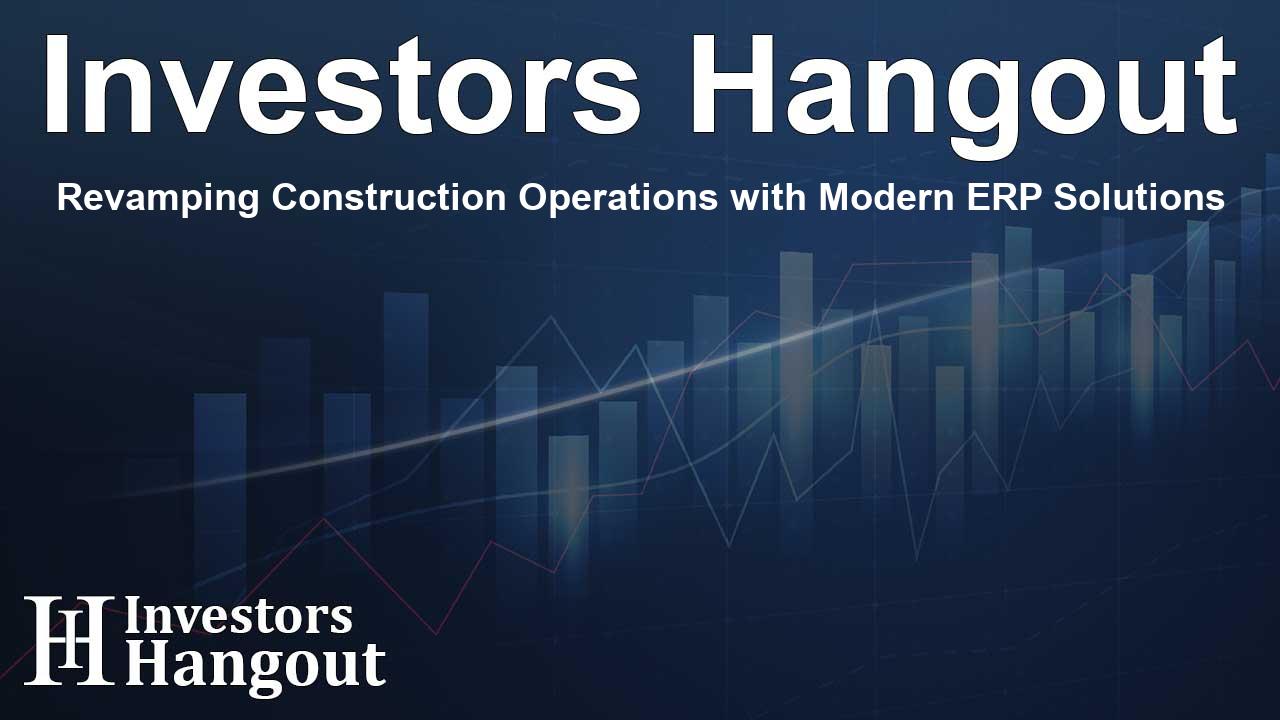Revamping Construction Operations with Modern ERP Solutions

Revamping Construction Operations with Modern ERP Solutions
In today's competitive landscape, construction firms face increasing operational complexities as they manage projects that demand higher efficiency and productivity. According to recent insights from Info-Tech Research Group, implementing modern Enterprise Resource Planning (ERP) systems tailored for the construction industry can significantly transform these operations. Their comprehensive blueprint provides a structured method for organizations to evaluate, select, and implement ERP solutions that meet their unique needs.
Understanding the Challenges
The construction sector is characterized by its project-based nature, which can complicate operations and hinder the realization of full productivity potential. Info-Tech Research Group's research indicates a common theme: many firms struggle with a saturated vendor landscape and high implementation costs. These obstacles often stall necessary ERP initiatives, leaving organizations without the essential tools that facilitate growth and operational success.
Why Modernization is Key
Modern ERP systems are pivotal in driving efficiency and maintaining competitiveness in this ever-evolving industry. By leveraging tailored ERP solutions, construction firms can transform complex project data into actionable insights. This allows them to foster collaboration, minimize errors associated with manual processes, and pave the way for sustainable growth.
The Three-Phase Framework for ERP Evaluation
To help construction firms navigate the complexities of ERP selection, Info-Tech has developed a three-phase framework that guides organizations through the evaluation process:
- Identify Key Market Trends - Leaders in the construction industry start by assessing the unique challenges they face. This includes understanding current market dynamics and identifying tangible benefits of ERP adoption, ensuring that they tailor their approach to their specific operational context.
- Define Business Requirements - It’s essential for different stakeholders, including CIOs and department heads, to collaborate in defining the business requirements. This means mapping out organizational capabilities while identifying the critical features that an ERP system must have to support their operational success.
- Assess Solutions - With a clear set of requirements, IT leaders can evaluate vendor options. Establishing criteria to score potential ERP solutions helps teams avoid common pitfalls during the selection and implementation stages.
Benefits of the ERP Framework
Employing this structured approach helps construction companies reduce rework, enhance delivery timelines, and achieve better visibility across values chains. As the construction industry is under pressure from rising project scales and rapid digital transformation, this framework becomes increasingly relevant. It supports faster, data-informed decision-making processes.
Positioning for Future Success
As construction projects expand in scale and complexity, the importance of having a robust ERP system cannot be overstated. The methodology outlined by Info-Tech empowers IT and business leaders with the insights necessary to align technology initiatives with broader organizational strategies. By integrating a keen understanding of industry trends with defined business needs and a disciplined evaluation of solutions, construction firms can utilize ERP systems to foster innovation, adaptability, and growth.
For further insights and updates on this evolving topic, construction leaders should stay informed about emerging ERP solutions and strategies. The recommendations and resources provided in Info-Tech’s blueprint can serve as invaluable tools for firms looking to excel in a competitive environment.
Frequently Asked Questions
What is ERP in construction?
ERP stands for Enterprise Resource Planning. In construction, it refers to software solutions that help manage various business processes, including project management, supply chain, and financials, all in one integrated system.
Why is modernizing ERP systems important for construction firms?
Modernizing ERP systems helps construction firms streamline operations, improve data accuracy, and facilitate better collaboration among teams, ultimately leading to enhanced profitability.
What challenges do construction firms face with ERP implementation?
Common challenges include vendor overload, high implementation costs, and internal resistance to change, which can hinder the realization of ERP benefits.
How can construction firms choose the right ERP solution?
By following a structured evaluation framework that identifies market trends, defines business requirements, and assesses potential solutions, firms can effectively choose the ERP system that best meets their needs.
What support does Info-Tech Research Group provide?
Info-Tech offers comprehensive research and advisory services to help organizations make informed decisions about their ERP systems and technology investments.
About The Author
Contact Ryan Hughes privately here. Or send an email with ATTN: Ryan Hughes as the subject to contact@investorshangout.com.
About Investors Hangout
Investors Hangout is a leading online stock forum for financial discussion and learning, offering a wide range of free tools and resources. It draws in traders of all levels, who exchange market knowledge, investigate trading tactics, and keep an eye on industry developments in real time. Featuring financial articles, stock message boards, quotes, charts, company profiles, and live news updates. Through cooperative learning and a wealth of informational resources, it helps users from novices creating their first portfolios to experts honing their techniques. Join Investors Hangout today: https://investorshangout.com/
The content of this article is based on factual, publicly available information and does not represent legal, financial, or investment advice. Investors Hangout does not offer financial advice, and the author is not a licensed financial advisor. Consult a qualified advisor before making any financial or investment decisions based on this article. This article should not be considered advice to purchase, sell, or hold any securities or other investments. If any of the material provided here is inaccurate, please contact us for corrections.
